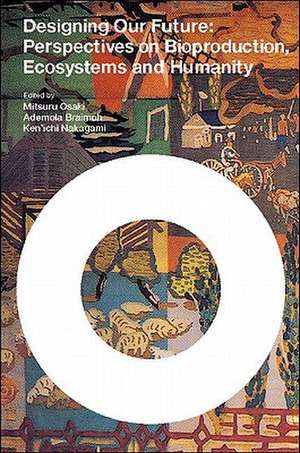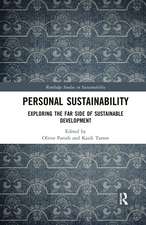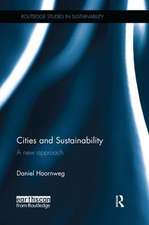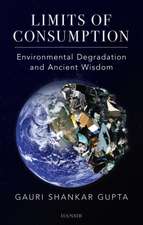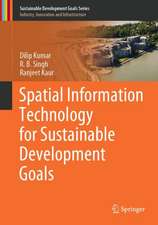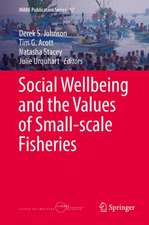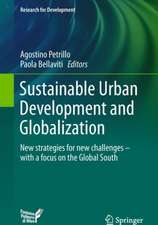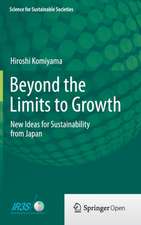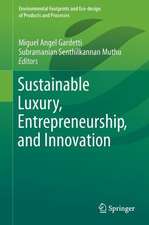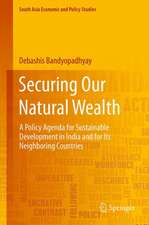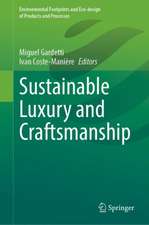Designing Our Future: Perspectives on Bioproduction, Ecosystems, and Humanity: Sustainability science series
Editat de Mitsuru Osaki, Ademola Braimoh, Ken'ich Nakagamien Limba Engleză Paperback – 15 feb 2011
This volume focuses on society at the local and regional levels in a scenario where human beings coexist harmoniously with nature. This ideal society is examined in terms of the relationships between villages or towns and their natural environment and how they can achieve independence while facing pressures toward centralization and globalization. Because this requires both food and energy independence, farms, villages, and towns must have access to natural renewable energy and material circulation systems. There also needs to be a system to facilitate collaboration among the various elements.
To enable communities to retain their autonomy, public awareness of the importance of fostering local cultures and traditions is vital. Cultural independence demands that local ways of thinking be steered away from the "plunder nature" model toward "coexistence with nature." With economic globalization spearheading a trend toward standardization and uniformity in human values, this book highlights the importance of developing a society in harmony with nature through the networking of diverse communities to promote and achieve local independence.
To enable communities to retain their autonomy, public awareness of the importance of fostering local cultures and traditions is vital. Cultural independence demands that local ways of thinking be steered away from the "plunder nature" model toward "coexistence with nature." With economic globalization spearheading a trend toward standardization and uniformity in human values, this book highlights the importance of developing a society in harmony with nature through the networking of diverse communities to promote and achieve local independence.
Preț: 319.88 lei
Nou
Puncte Express: 480
Preț estimativ în valută:
61.23€ • 66.53$ • 51.47£
61.23€ • 66.53$ • 51.47£
Carte tipărită la comandă
Livrare economică 22 aprilie-06 mai
Preluare comenzi: 021 569.72.76
Specificații
ISBN-13: 9789280811834
ISBN-10: 9280811835
Pagini: 425
Dimensiuni: 152 x 229 x 28 mm
Greutate: 0.76 kg
Editura: Brookings Institution Press
Colecția United Nations University Press
Seria Sustainability science series
ISBN-10: 9280811835
Pagini: 425
Dimensiuni: 152 x 229 x 28 mm
Greutate: 0.76 kg
Editura: Brookings Institution Press
Colecția United Nations University Press
Seria Sustainability science series
Notă biografică
Mitsuru Osaki is director of the Sustainability Governance Project, Hokkaido University, Japan. Ademola Braimoh is executive director of the Sapporo Nodal Office of the Global Land Project, Hokkaido University. Ken'ichi Nakagami is a professor at the College of Policy Science, Ritsumeikan University, Japan.
Descriere
This volume focuses on society at the local and regional levels in a scenario where human beings coexist harmoniously with nature. This ideal society is examined in terms of the relationships between villages or towns and their natural environment and how they can achieve independence while facing pressures toward centralization and globalization. Because this requires both food and energy independence, farms, villages, and towns must have access to natural renewable energy and material circulation systems. There also needs to be a system to facilitate collaboration among the various elements.
To enable communities to retain their autonomy, public awareness of the importance of fostering local cultures and traditions is vital. Cultural independence demands that local ways of thinking be steered away from the "plunder nature" model toward "coexistence with nature." With economic globalization spearheading a trend toward standardization and uniformity in human values, this book highlights the importance of developing a society in harmony with nature through the networking of diverse communities to promote and achieve local independence.
To enable communities to retain their autonomy, public awareness of the importance of fostering local cultures and traditions is vital. Cultural independence demands that local ways of thinking be steered away from the "plunder nature" model toward "coexistence with nature." With economic globalization spearheading a trend toward standardization and uniformity in human values, this book highlights the importance of developing a society in harmony with nature through the networking of diverse communities to promote and achieve local independence.
